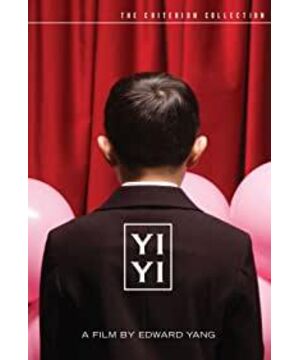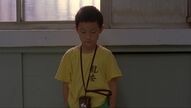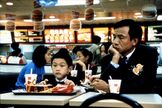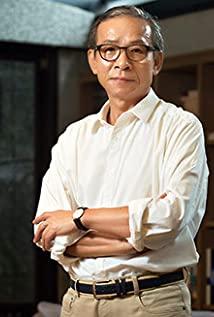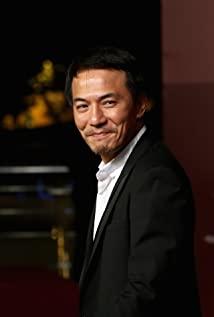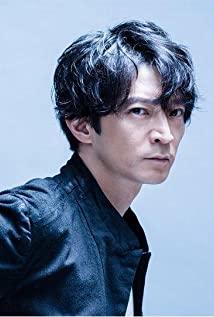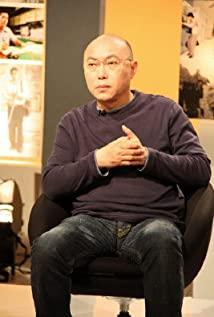Original address: http://blog.sina.com.cn/sianvshero
Life is So Flowing - Content Deconstruction "One One" (Photo)
December 13, 2004 Dimei-Original DVD Club Fujii Tree 171 Collection
Total It took two and a half days to watch "Yi Yi" twice, three hours each time. I admire Yang Dechang's patience, and the long shots are designed to capture the life of an ordinary family. There is no great sadness or joy, it seems that everything that happened is experienced by our side, but my heart is still covered with a layer of faint melancholy. Perhaps it is because of Yang Dechang's unusually calm camera that I can clearly see the true colors of our lives. The middle-aged father's repression and hard work, the mother's sudden shock and sorrow, the first love unfolded by the kind and pure daughter who was just in love, and the angel-like little son's camera shooting the back of other people's heads. When I think of watching Ang Lee's "Diet Men and Women" before, I was in a hurry. Life is like a sea, the calm surface of the sea contains endless stormy waves, and none of us is happier or sadder than the other. It turns out that what you are worried about is also his struggle, and her sadness may have been suffered by you. We all grow and live the same.
Getting married:
The beginning of the beginning is a wedding.
The first thing that enters my ears is the sound of the piano one after another. I think of Iwai's works, the clean and soothing music in "April Story" or "Love Letter" and "Dream Traveler". Such a piano paired with two newcomers in dresses made the viewers feel a lot of emotion. Just a turn of the camera, we see that the bride's dress is raised, it turns out that she has been pregnant for several months. Another strange woman appeared in the picture, and she ran to the groom's mother and cried. She is the groom's old lover.
Nothing can be changed. Today's vows are just a short farewell. This woman's untimely appearance is nothing more than a little bit of unwillingness in her heart. What else can she ask for?
Reunion:
I don't like this term, it means a lot of things that I thought could be settled down again.
During the wedding, the groom's brother-in-law met his first love. After not seeing each other for more than ten years, the reunion of the two sides at the elevator entrance made each other fall into the abyss of memory. The long stare was followed by a polite greeting, and then the woman left. It's just that she won't leave like this, she still turns back.
This time, it was a series of questions. When the resentment and concern that had been in her heart for so many years finally had a chance to vent, the woman's anger was obvious. At this time, the elevator door opened again, and their former classmates came out. So it was polite and friendly again, and it all seemed to end there.
But everyone who sees it understands that the story has just begun.
Stroke:
This kind of disease is usually caused by the elderly. Suddenly, without warning, he lies on the bed like a vegetative state, making all relatives at a loss.
The crazy person in the movie is the groom's mother. I always felt that the old lady's stroke was a deliberate arrangement by the director, so that the people inside could have a window to examine their own lives. As a result, almost all of them would go to the old man's bedside and talk to themselves, the granddaughter's self-blame, the son's hesitant talk, and the daughter's grief.
Neighbors:
Humans are social animals, so we all have neighbors. And the neighbors actually live the same life as us, either sad or not. It's just that many times we pretend not to see, because that's someone else's story, even though they're just a wall away from us.
In the movie, in addition to the groom's family being photographed, the brother-in-law's neighbors are also presented together. It was a single-parent family with a charming mother and a capricious and beautiful daughter. We saw the daughter kissing her lover at the elevator entrance, and we saw the mother dodging the curious eyes of her brother-in-law's younger son in the same place. When the sister next door cried to her husband because she was shocked by the monotony of her life, her ears were filled with the fierce quarrel between the neighbor's mother and her lover. Thinking of Almodovar's shots, there is often a building full of lights but no curtains. We can see the secrets in every window following the pictures. Some people are talking, some are silent, some have sex, and some are lonely. Just as God looks at us, we don't know, but He sees clearly.
No one in this world cares about anyone, and everyone is equally entangled in clutching and reunion.
Crying:
Although this is a natural human instinct, let us think about it, once we are adults, we rarely cry. Do you remember what was the last time you cried? Break up with your boyfriend or leave your loved ones? Most of the time we choose to put our grief in our hearts and pretend nothing happened and let time drown out everything. Really, an adult actually rarely cries in real life. Not because of being strong, but because we don't have enough reasons to cry.
But people in the movie cry, there are tears like those in cartoons, and there are silent tears in the dark. What I remember in "Yi Yi" are these two kinds of crying, the former one is from the bridegroom's sister, and the other is the sister's daughter.
The bridegroom's sister was sobbing in the face of her husband, because she found herself saying the same things to her mother lying in bed every day, and these words were what she lived every day. She found that her life had turned out to be so monotonous, that she had finished speaking in a few words, and that today was a preview of tomorrow and tomorrow was a continuation of eternity, so she cried bitterly. In fact, we in front of the camera are not like this, but we have no chance to know it. But what can I do if I know it, plain and ordinary are the true colors of life, passion is always a momentary fireworks, it hurts my eyes and burns my heart. Can't keep it, can't keep it, in the end, everyone is happy.
And my sister's daughter, who was in high school, shed tears silently when she faced her grandmother lying on the bed again and again in the dark because the girl's heart was indescribably pure. There can't be half a grain of sand, as the wind blows, it seems to hurt, so tears will fall. Tingting felt that she forgot to take out the trash and caused her grandmother to have a stroke, so she hoped that her grandmother would wake up as forgiveness for her. After her first love ended, she came to her grandmother's bed to cry again, because she didn't understand why the world wasn't as beautiful as she imagined, and why her sincere efforts were rewarded with thorns like thorns, and we also saw This is how a girl grows up.
camera:
In my eyes, the inventor of the camera is someone who has the same status as Darwin who proposed the theory of human evolution. With the camera, we can stop time and allow us to see the world at that moment after the fact. In "Yiyi", the camera is a weapon for discovering the truth, but it is used by a child in elementary school, the youngest son of the groom's sister, Yangyang.
This kid doesn't talk much, he's not a naughty guy in the usual sense. But he is really a very unique child. For example, he always believes that seeing is believing. For example, he told his father that people can only see half of the truth, because we have no eyes behind us, so we cannot see the half of the truth behind us. His dad said it could be done with a camera, so he aimed at the back of everyone's head, a place our eyes would never reach.
And what I thought of was a sentence I read in a book many years ago: "I don't know why every time I see this woman, I feel that her back is very lonely." It turns out that there is also a world behind a person, because it can't be concealed, maybe closer to reality.
School:
This is the place where everyone receives education. Some should be sunny, rainy, and drizzly. But this is not the case. In many cases, this is also the first place where children know sadness and low self-esteem.
Yang Dechang doesn't seem to have much affection for the school. In "One One", we see that Yangyang's encounters in the school are unpleasant. There was a director who was on crutches all day, lest the world be in chaos, and there were a few girls who made small reports in front of the teacher. Yangyang's balloon was reported as a condom by a girl. He couldn't understand the director's question, and what I didn't understand was that elementary school girls understand the meaning of this term? Yangyang's photo was ridiculed by the director. The child in the camera looked at the adult silently, but what I felt was the stupidity and ignorance of the adult. Who is smarter than whom, and who educates whom? !
First love:
A classmate in college once said something that made me panic: "The success of a first love lies in failure."
In "One One", there were two first love entanglements, the father's and the daughter's.
Yang Dechang is worthy of being a skilled director, and he vividly presents the origins and transitions of these two relationships without revealing any traces. Daughter Tingting started because of a letter. It turned out to be a postman for a neighbor's daughter, but the boy fell in love with him. The unfolding of love is like that of all the girls who are in love. They changed their school uniforms and began to linger in front of the mirror to try on all kinds of beautiful skirts. It was the first time to ride a boy's bicycle, the first time to watch a movie with a boy, and he finally held hands when crossing the sidewalk, and he finally kissed him under the viaduct in front of his house.
The camera has been cutting, cutting to the whereabouts of his father in Japan. Because the lover who reunited at the wedding also came to Japan, just for the man's goodbye. In order to get an explanation, let go of the heavy burden in my heart. Much like Zhang Aijia's "Heartbeat", the reunion between Takeshi Kaneshiro and Gigi Leung after many years caused the ripples in each other's hearts to make those who watched it moved. Finally, I was able to explain it calmly, and even tried to explain the reasons why they fell in love with each other back then. Because it is in such an unfamiliar place as Japan, people are as clear as a vacuum. They embraced without hesitation when they met, and embraced with emotion in the middle of the night. No matter how much turbulence and struggle were melted into these tight embraces, everything was still a ritual. They knew that the past was the past after all. First love It belongs to memory long ago.
Looking at our past, what is tangled in our hearts may only be our own unwillingness. There is no regret or helplessness. When we have experienced our first love, we have taken the first step of maturity.
Work:
I used to think that work is a hobby, and people work only to do what they like. But now I know more and more that work doesn't really mean anything else, work is work, it's more about survival. Work is also a way of life. There are very few people in this world who regard work as an enjoyment, and even more pitiful are those who can fully give their sincerity without wearing a mask at work. The brother-in-law in "Yiyi" is the man who does this. We all knew it was the right thing to do, but at the same time we clearly felt the pressure and pain he was under. He is still not happy.
For the business of his company, the brother-in-law went to discuss business with a Japanese client. This Japanese is a person with the same temperament as him, and once they communicate with each other, they find that they are the kind of people who can be friends. So they drank and chatted together. Although they both spoke in non-native English, what they saw in their eyes was sincerity and trust. It's just that the outside of friendship is still covered with the hard shell of work, and the decisions made by the company will still hurt the hearts of friends. One injury is two people. I can't tell what to do in such a situation in the future. My view of right and wrong is not enough.
Later, my brother-in-law's colleague told my brother-in-law that he was never happy when he worked hard every day. The brother-in-law told his colleague that he was doing things he didn't like.
So what exactly are we working for? "Yiyi" raises such a question, who can answer it? !
Funeral:
The last is a funeral. There are still piano sounds one after another, with bright sunshine and rich green trees. The atmosphere of sadness has weakened instead, and some are melancholy without an end. Everyone's story in the film continues, but the departure of the mother-in-law indicates that the window that can examine his soul has been closed. In the remaining years, I don't know if there is such an opportunity for them to see their own lives. In reality, at least we don't know it.
Starting at the wedding and ending at the funeral, Yang Dechang may be trying to tell a complete life, with the birth of a small life in between. But what Yangyang said to her mother-in-law made me in front of the camera sigh. He was still saying that what he saw was believing. He felt that her mother-in-law went to a place that no one could see. He missed his mother-in-law, especially when he saw the little cousin who didn't have a name. He finally understood why his mother-in-law always said that he was getting old, and he felt that he was getting old too.
When a child in elementary school lamented his old age, I couldn't tell whether Yang Dechang was talking or I was talking. The sound of getting old is the greeting of life renewal or the beginning of self-knowledge, I don't know.
"One One": Questions about the Life of Modern Chinese (Photo)
On February 1, 2005, it was written on the edge of the film and downhill 180 Collection
The beginning of Yiyi is full of metaphors. A young man's wedding, Western-style packaging, Chinese-style content, mixed with incongruous notes - the troubled groom's ex-girlfriend, the bride's bulging belly, the chaotic scene of the wedding reception. Immediately followed by an old man's misfortune, the mother-in-law fell into the hospital and became a vegetative person...
Life
"What is human existence? What is its true meaning?"
Stern's contemporary Fielding believed that the answer lies in actions and the finale. The answer in Stern's novel is quite different: the answer is not in action and in the finale, but in the interruption of action. ——Speech of the Jerusalem Literature Prize, Milan Kundera
The wedding and the accident of her mother-in-law were a moment of interruption. During this period, Jian Namjoon's family discovered their true life status like apocalypse and began to ask about the meaning of life.
Jan Nam Joon is a manager of a computer company. At Adi's wedding, he met his first love, Sherry, in front of the elevator, and hooked up a sad past. Because it was difficult to reconcile his lover's expectations with his own pursuit, he bid farewell to his first love with an uncompromising attitude. Encounters many years later awakened the conflict between career and ideals that had been settled in peace. Hypocrisy, lies, and betrayal in the marketplace suddenly became unbearable. However, what is even more unbearable is the helplessness of life. Back then, Jian Nanjun left true love because he couldn't sacrifice his ideal for love, but after many years, he suddenly found that the trajectory of his life was far away from his original ideal, and the person he loved was no longer by his side. Thirty years later, he said to Sherry, "I've never loved another person," as if to self-examination for his needless insistence. If you know that your ideal will eventually fail, then if you choose Sherry at the beginning, wouldn't there be at least love? But even if he still loves Sherry today, he has no choice but to be a son, husband and father. If you could have a second chance in life, how would you choose? Jane Namjoon broods at home, listening to Bob Dylan's song:
How many roads must a man walk down
before they call him a man?
The answer my friend,
is blowing in the wind...
The doctor said that talking to her mother-in-law might awaken her consciousness, so talking to her mother-in-law became a daily homework for the family. When you talk to someone who doesn't have any response, you are actually talking to yourself. Jian Nanjun's wife, Minmin, suddenly found that her daily experience was "finished in a minute", and it was the same every day. She suddenly fell into confusion, what is the meaning of her life? In addition to the obligations and responsibilities of family and work, what do you have left? So Minmin decided to become a monk, but returned soon after. Minmin's disillusioned is perhaps the deepest, as she dares to step out of her own life, but the actions bring no results. Life is like a delicate situation, when you are caught in it, there is no answer, and action is wrong.
Jan Namjoon's daughter Tingting represents the beginning of the journey from innocent to disillusioned. The picture of life has gradually unfolded in front of her, and the young and innocent she has no defense against it. At the age when she is most looking forward to love, she sees love, marriage and sex in reality, full of deceit, infidelity and hatred. Her young love was like a boat in a storm that soon capsized. Tingting began to ask herself, "Why is the world not what I imagined it to be?" She asked her mother-in-law, "If you knew the world was like this, would you still be willing to open your eyes?" Perhaps the biggest motivation for supporting life is the expectation when you were young. The vision of the road ahead, my mother-in-law has reached the age of no dreams, so she will not wake up. And Tingting will continue to persevere, until the age of her parents, to the age of her mother-in-law...
Stern may mean that only when life is blocked by sudden events, people will stop and think about the meaning of life, Measure your original goals and your current situation. Namjoon's interruption came from a career disappointment, Minmin's interruption came from a conversation with her mother-in-law, and Tingting's interruption was due to the tragic end of the first love.
The youngest son Yangyang is the most active factor in the film, he represents the constant action of life. He is a small and taciturn boy, but full of the most authentic and fresh vitality of life. His appearances were also fraught with frustration—girls bullied him for no reason, and the dean scolded him for using condoms as balloons. But he always gave people hope, and whoever hit him, he was always able to fight back. His actions are direct, effective and well-targeted. When he began to develop a favorable impression of a girl who loved swimming, he began to practice holding his breath in the bathroom and bravely jumped into the swimming pool that might submerge him. But is action the way to find meaning in life? Isn't the confusion of the humane middle-aged Jian Nanjun exactly because of his reckless actions? In an instant, Yangyang gave us hope - he climbed out of the swimming pool that we thought drowned him, and returned home wet; but in an instant, he It makes us doubt again - at the end of the film, Yangyang said to her mother-in-law's portrait: "I think I'm getting old." Perhaps the constant difficulties of life will eventually consume this natural vitality.
The story of "Yi Yi" is like an interception from the slow-moving symphony of life. You think it will stop at any moment, but in reality it can continue forever. Each character plays a different instrument, and this moment plays a different note under the command of fate. Namjoon, Minmin, and Tingting pause and bewildered after a sudden strong sound, trying to recall the theme of the entire movement, but to no avail. Yang Yang, who had just joined the ensemble, continued his performance tenaciously, but he could vaguely anticipate the arrival of a sudden high-pitched note.
Love
Thomas believes that he and Teresa met by six coincidences...
Teresa felt that it was these coincidences that set her love on the road and gave her the strength that would never fail... ——" The Unbearable Lightness of Life, Milan Kundera
The men and women in "Yiyi" show us another eternal theme of life: love. Love may be the answer to the question of the meaning of life, at least it was at some point in our lives, and for some it may always be. But even if you take love as the meaning of life, how can you be sure that the same is true for your significant other? How do you ensure that two tiny individuals in the vast world can stay in sync from beginning to end? Maybe after you've replaced your life questions with love questions, you'll find that you still can't answer them. Just as you can't bear the loss of fate, you may also be unable to bear the loss from people.
Like the spear in the male symbol, the men in "Yi Yi" are constantly looking for the answer to life from the outside world, and love is just a tidbit that can be discarded. Jian Nanjun once acted as resolutely as Yang Yang, and he did not hesitate to give up love in order to realize his ideal in life. Even though he knew he "never loved another man". Ah Di is one of the few main characters in the film who is not disillusioned. The meaning of his life is to keep getting money, even if the process itself is fraught with frustration, humiliation and deceit. Ah Di is also hesitant among women, but when he talks to his mother-in-law, all that matters is "I am rich now", and women are not mentioned at all.
The women in "Yi Yi" are more looking for the meaning of their life in love. Whether it is Sherry, Tingting, Adi's wife and girlfriend, they are all trying to pursue or maintain love. Adi's two women are fighting each other by various means; the chance encounter 30 years later will still arouse Sherry's desire to find love, even at the cost of giving up his current life. In the face of love, they are as brave and active as men in the face of ideals. But will they find out? In the movie, Tingting's tender love and the love in the adult world are like opening a time tunnel in front of us - Tingting began to try to find love, but adults have lost themselves in love, and love is finally submerged in the obligations of marriage, Sexual cravings and problems of survival.
Can love solve the problem of meaning in life? Minmin's eventual disillusionment symbolizes the end of her love affair. When the first passions have calmed down, questions about the meaning of life linger in the air like lingering nightmares, and there are no answers in marriage either. Sherry's two love stories with Jian Nanjun back then and today seem to tell us that the different attitudes of men and women towards love determine that love is not a key to open the door of life, but another problem through the ages.
Culture
Taipei is not my home. My hometown has no neon lights . Lukang’s morning and Lukang’s dusk. People wandering in
civilization—“Lukang Town”.
Taiwanese society in transition to modern times makes this process doubly painful. On another level, "Yi Yi" shows us the painful transformation process of Chinese culture into modern commercial culture. From the outer shell, Taiwan is already a very commercial society, full of bright lights and high-rise buildings. But inside this modern surgery is still a mind confused between the past and the present.
Namjoon is always trying in vain to maintain his principles in the mall, but he fails like his suits always don't fit. He hopes to cooperate with Daejeon to really make something successful, instead of relying on copying for quick success to maintain the company's survival. Even while traveling in Japan with his first love, he tries to maintain a certain moral principle. But he seemed so out of place in the business world. Vaguely, you would feel that his moral principles and uncompromising are the reasons for his unsuccessful career and love. He has been trying to take what he thinks is the right path, but in reality it seems that it does not exist and is impossible.
Jian Namjun's fortunes represent the embarrassing situation of traditional morality in modern society. In an eastern society without commercial traditions, the rapidly expanding commercial culture is like a flower of evil, extending its tentacles until it erodes and occupies every inch of space. Is traditional morality doomed to fail in the face of hybrid business culture? Yiyi is pessimistic: the coma and death of the mother-in-law symbolize the invalidation and death of tradition; the noisy wedding and the pregnant bride signify the arrival of a time of chaos and vitality at the same time. "Yi Yi" does not make a judgment between the two. Like a documentary, it shows all living beings living in this period of yin and yang in a concentrated and intensified manner in a three-hour film. Invisibly, you will be occupied by the depressive atmosphere of the whole film, as if listening to a bleak dirge.
balloon and camera
Every movie I’ve made, from the first to the most recent one, is about a group of people who can’t find their way, don’t know how to live, don’t know what’s right and what’s wrong— Some people who are desperately looking for some basic answers, like what is all this for? Why do you have to get up in the morning? Why do you want to sleep at night? Why bother getting up again? How to pass the time between waking up this time and waking up next time? How do you live your life so that you can shave or put on makeup in the morning in peace? - "Kislowski on Kieslowski,"
Christopher Kieslowski
Yangyang always uses balloons as his weapon of revenge. The balloon exploded, the little girl got into her mother's arms and cried, and the dean of the school was furious and cursed. Yangyang was taciturn, but he was speaking from a balloon:
"Your life is like a balloon,
you trample others with your nihilistic pride.
I let the balloon burst in front of you.
If you feel scared or angry,
prepare yourself
Your life will collapse before your eyes one day.”
If we were still balloons before we walked into the cinema, Yang Dechang (Yang Yang) let us go out with a tragic motto of our fate: the story of Yi Yi It's the balloon that pops right in front of your eyes. Either because of a needle point, or because it's been stretched for too long, one day, at an opportunity you can't predict, you'll lose those things that keep you afloat and start falling, falling down...
The camera is Yangyang's other weapon. Yangyang uses it to shoot those things that everyone takes for granted, and those things that follow like a shadow but go unnoticed. Yangyang gave Adi a photo of the back of his head - "You can't see it yourself, so I'll take it for you". It is always difficult for people to jump out of their living conditions and examine themselves objectively. So movies are an opportunity. Some directors can expand your experience and make you experience life that you have never experienced; some directors, such as Yang Dechang, show you the "back of the head". The camera is Yang Yang's weapon, and the movie is Yang Dechang's weapon. Yang Dechang is Yang Yang on the director's chair. "Yi Yi" is not a mirror that lets you see your face, but Yang Dechang's record of the back of your head.
What is the meaning of life? Is it love, career or money? Is tradition inevitably dying? "Yiyi" is constantly asking questions, but there are no answers, only plain narratives and pessimistic emotions. "Yi Yi" not only shows the confused crowd in front of the camera, but also you can feel the confused Yang Dechang behind the camera.
The role of art is to ask questions, not answer them. In order for the problem to be powerful, it needs to be simplified and strengthened. Many scenes in "Yi Yi" corroborate each other with personal experience and social experience, so I seem to be both an audience member and a part of the film. I appreciate "Yi Yi" but not the process of watching it, just as you can appreciate someone's understanding of your pain, but you can't enjoy his description of your pain - for days I couldn't get out of that depression feeling freed.
Seen and Unseen "Yiyi" Philosophy
Wooden House Yiren Posted: 2008-04-24 12:56
Inscription
In the news last year that Yang Dechang passed away in Japan, the media and filmmakers lamented the departure of another master. I had never heard of him before, and it was only because of his departure that I knew he was a leading figure in Taiwanese cinema. His works are not many, but they are all profound. I don't think it's too late for me to get into movies, but unfortunately I never paid much attention to Taiwanese movies. Knowing Hou Hsiao-hsien is due to the media coverage, and his poetic and hazy style has marked Taiwan with a distinct mark. I have never seen his works, "Sad City", "Flowers on the Sea", etc. are still listed in my movie viewing plan, but it will be a long time. As for Ang Lee, he is currently the most famous Taiwanese director in the mainland (I don't know if it counts). The only thing I've ever seen is "Crouching Tiger, Hidden Dragon". When I first saw it, I didn't feel it was painful or itchy. With the growth of experience and spiritual maturity, I gradually seemed to understand why Americans recognized such a martial arts film as China. (It mainly refers to the box office in the market, which represents the audience's preferences and has nothing to do with professional film critics.) I know very little about the remaining directors such as Cai Mingliang and Li Kangsheng, but they are all known through film festivals. However, knowing Yang Dechang was caused by his death. Such a result made the image of director Yang Dechang create a great mystery in my heart.
The first article: I can see
that the picture gradually appears, and the music slowly sounds. What I can see is that a new family of harmony and beauty is about to be born. Adi and Xiaoyan got married, and they built the family together with the fetus in Xiaoyan's womb. Adi's sister Minmin, brother-in-law Jian Nanjun, niece Tingting, nephew Yangyang, and elderly mother all attended his wedding. In addition, Adi's friends and classmates also came to congratulate him. I think this movie should be full of joy.
Soon I saw that Tingting forgot to clean the garbage on the balcony because she was fascinated by her neighbor Lily kissing the fat man. Tingting's mother-in-law, Adi's mother, fell to the ground due to a cerebral hemorrhage (another reason may be being hit by a car) when she went downstairs to dump the bag of garbage. The movie has not yet made it clear who the protagonist is, and a minor episode begins. What should the family do? This is what I want to know.
I saw that the whole family worked hard for my mother-in-law's recovery, but then everyone gradually got used to her lying quietly on the bed. At this time, Minmin faced the pressure of work and her mother's serious illness was at a loss. Jian Nanjun's company also had financial problems, and it was divided and merged with a Japanese company called Datian. When Tingting was adjusting the love dispute between Lily and Fatty, she was also confused. Yangyang was always scolded and criticized by the dean because he didn't understand many issues that he actually wanted to figure out. Adi also swings between his old lover and his new wife, and at the same time is deceived by a bad friend named "Azhu". Lily is caught in the wrath of her mother's affair with her English teacher. All people have their own troubles and confusions. If you really want to say no, it's the mother-in-law in bed, but who would want that?
I continued to read without knowing exactly what Yang Dechang was going to do. Minmin went to the mountain to clean up, trying to get rid of everything. Jian Nanjun went to Japan to work with Datian, but he also spent a few days with his first love when he was young. Tingting and Fatty are in love, all this is so careful. Yangyang feels other people's experiences by slapping the backs of other people's heads, jumping out of swimming pools, and throwing water-filled balloons, and letting others see the backs of their heads that they can't see themselves. Lily ignored Tingting and began to choose another boy as her date. Ah Di has made a fortune again, this year he is the sixth and sixth Dashun. Everyone is freed, everyone finds their new life. The mother-in-law was still lying on the bed, and no one paid attention to this matter.
Time goes by bit by bit, and life goes on. Adi's child was born, and her mother-in-law passed away peacefully. Minmin returned home from the mountain and took care of her mother's funeral. Jian Nanjun's company worked hard in vain, and his first love left without saying goodbye. Fatty left Tingting and reunited with Lily. Adi and his wife cherish each other more in a gas leak accident. Lily disappeared because Fatty helped her kill her English teacher. Yangyang opened his notebook in front of his mother-in-law's portrait, and said the words that had been in his heart for a long time... At this point, I think I finally saw what Yang Dechang wanted to tell us.
Chapter 2: Can't see
We are always complaining in life, always trying to get out, always trying to discover something new. But there are some things we can't see. Only after experiencing a gain and loss, can we ignorantly see things that we couldn't see before. It's like the back of our head, which we can't see at first. With the help of the camera, we can clearly see what it looks like.
It was only when Minmin was on the mountain that she realized that she had gone to the mountain and her life was still the same. However, she changed from telling her mother to listening to the words of the people around her. After Jian Nanjun regained his old love with his first love, he found that there was still no change in his life, and he returned to the life he had adapted to. Tingting got her own redemption after trying a love affair. She made a mistake by forgetting to clean up the trash, and now her mother-in-law's sobriety has made her forgive herself. Although Yangyang still doesn't understand many things, he already knows what he can't see.
As for Lily, Adi, Xiaoyan, there are still many people who still know what they can't see. They have to go through more things to understand something. Yang Dechang, who graduated with a master's degree in electronics, brought us such a profound work with inadvertently obvious plots and conflicts. Do people who study science really have to be rational? We also have to comprehend this philosophy of rationality from life.
A dialogue between Tingting and Fatty about the movie made me ponder for a long time. Whether the film is the same as life, or whether the film is a reconstruction or reproduction of life. If it's reinvention, then the movie is the real drama, it articulates and embellishes our life properly, and gives us a unique appreciation journey. If it is now, then the film is a documentary, it shows our life in front of us as it is, and allows us to see things that we often don't see. What is it about movies? And what is the relationship between our lives, I will not discuss too much. Everyone has their own opinions, and it is not to define the movie in their hearts according to movie theory. What we want is a movie that brings us to think. No matter how entertaining a blockbuster is, there are some directors who want to tell us. Freud and Jung believed that art is an extension of our desires. What are our desires?
Chapter 3: I thought
"Yiyi", why "Yiyi"? When the title of the movie began to appear, I found that the two "ones" were not written in a row, but in a column. If we don't know it's two "ones", we might even think the title is "two". One produces two, two produces three, and three produces all things. Philosophical ideas are everywhere. In addition, the English title of "Yiyi" is also very interesting. "A One And A Two" is directly "one" and "two". The translation is so straightforward. It is estimated that he was afraid that foreign audiences would find it difficult to understand the profound meaning of "one" in Chinese traditional culture, and directly told everyone that this was the director's intention.
The technical aspects of the entire film aren't that great, and the story isn't all that engaging. So how can we "persist" in the nearly three-hour movie? Delicate depiction is a major attraction, and a strong sense of life is also a major feature. We don't know where and when the end will end. What about actors? I only know Jin Yanling and Xiao Shushen. The first one impressed me because of last year's "Apple". Emotions are naturally revealed in this film, crying, and rolling tears streaming down my face. On the one hand, ask yourself why life is so fragile. On the other hand, my heart is confused, what is the forbidden place that I cannot see? The latter made the entertainment headlines at the end of last year because of negative news such as drug use and drug use. Fortunately, Yang Dechang discovered her at that time, and she was quite satisfactory in the film, and her performance was acceptable. Director Yang Dechang's ability to tap the potential of actors is obvious to all. It turned out that when I watched "Crouching Tiger, Hidden Dragon", I had no idea who Zhang Zhen was. Now, because of knowing director Yang Dechang deliberately, I know that this gentleman has long been envious in "The Murder of the Youth on Guling Street".
"One" is our life. It seems to be flat, but in fact it turns left and right on this guideline and moves forward in twists and turns. When we go above the "one", we can't see the bottom of the "one", and when we go under the "one", we can only see the bottom half of the world. By the time we got to the end, the line was still straight, without any pretense. (I don't know if I understand it right)
After watching this movie, I think the master really has a reason. Not everyone can realize profound truth in the ordinary. For life, I think it's better not to escape, not to deceive yourself, and to face it bravely. Sing every note in life one by one, and comprehend every growth in life one by one. We have to admit that we don't see something, and we also have to know that we see something too. The most important thing is that we also need to understand what we can't see, and think about how to work hard to discover these forbidden areas in life that are changing at any time. While we are digging, we are also growing and getting older. Just like Yangyang, Tingting, Minmin and Jian Nanjun, mother-in-law in the film, they appear to be four generations, but in fact they are four different stages of life. Let's go to the end slowly, "My life has a limit, and my knowledge has a limit." In addition to knowledge, life also requires us to learn slowly.
View more about Yi Yi: A One and a Two... reviews


